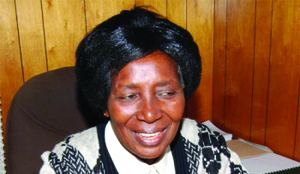By JOWIT SALUSEKI –
GENDER Minister Inonge Wina has called on stakeholders in the country to ensure that more women have access to farming inputs through the Farmer Input Support Programme (FISP) to enhance productivity.
Ms Wina was speaking in Lusaka yesterday at the Launch of the translated local language handbook on the National Referral Mechanism on Anti-Gender Based Violence Act of 2011 as well as the Gendered
Assessment of the Farmer Input Support Programme Report.
She noted that an analysis of women and men’s participation in FISP showed that the programme had benefited more men than women despite females constituting the majority of the farming population.
“The Gendered Assessment Report for the FISP indicates that access to the fertiliser Input Support Programme is still dominated by men, yet women are the majority producers of crops arising from such
inputs. This report therefore is envisioned to create dialogue with stakeholders on the key strategic areas and priority interventions for gender equality within the Farmer Input Support Programme,” she said.
She said her ministry will continue to dialogue with different ministries to ensure that gender is mainstreamed so that gender responsive development benefits all.
“In order to ensure that chiefs and traditional leaders help us in disseminating these materials, we will work closely with the Ministry of Chiefs and Traditional Affairs. We will also work closely with ZANIS and ZNBC on sensitising the public on the provisions of the Anti–Gender Based Violence Act in local languages,” said Ms Wina.
Ms Wina said her Ministry endeavoured to translate the Anti-Gender Vioence Act into the seven official local languages so that the public would understand the provisions in the Act and utilise the handbooks to their benefits.
The national referral mechanism on gender based violence handbook which has been translated into Bemba, Tonga, Luvale, Nyanja, Kaonde, Lozi and Lunda, will be distributed throughout the country.







